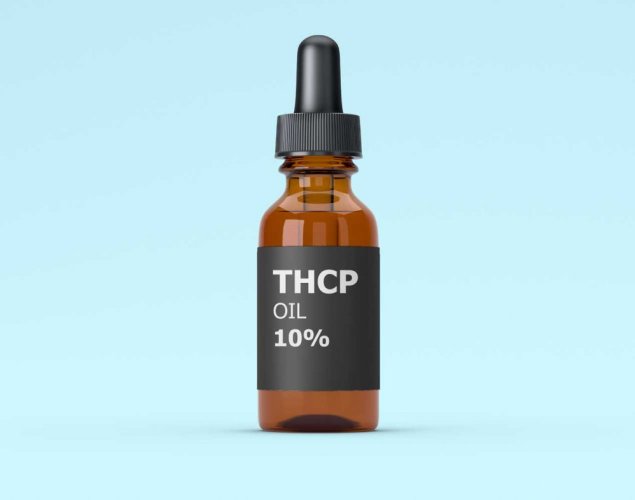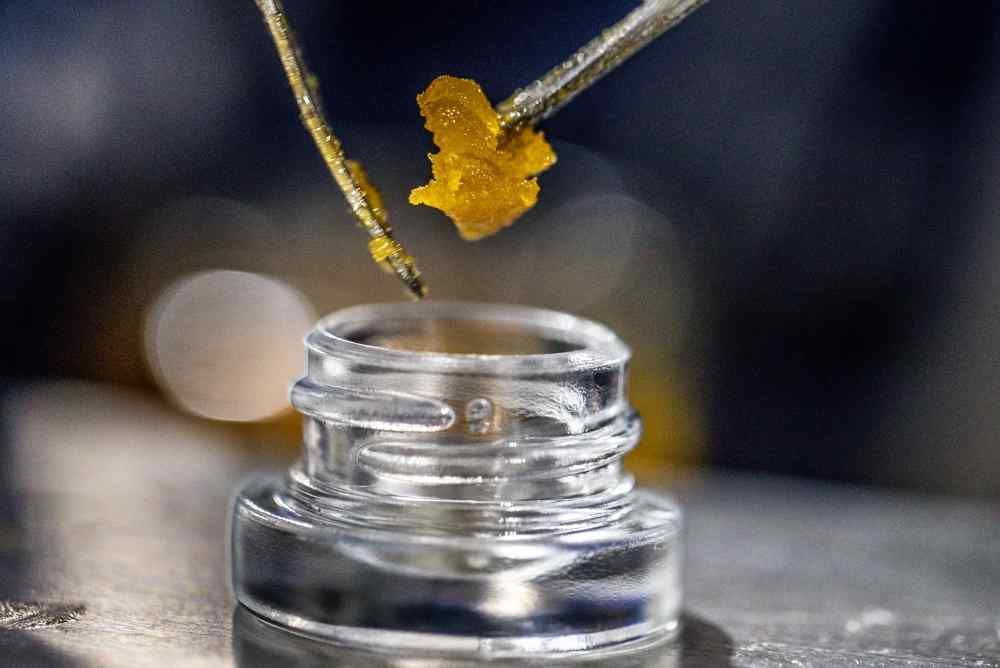What is THCP?
Are you hearing buzz about new cannabis compounds? Feeling lost trying to keep up with THCP? Let's explore this interesting cannabinoid that's getting attention.
THCP stands for tetrahydrocannabiphorol[^1]. It's a cannabinoid found naturally in cannabis plants. It's similar to THC, but its chemical structure, specifically a longer side chain, makes it potentially much more potent.

Now that we have a basic idea of what THCP is, you're probably curious about how it feels and how it stacks up against other cannabinoids you might know. It's fascinating how small changes in a molecule can lead to big differences in effects.
Does THCP get you high?
Yes, THCP is psychoactive and can get you high. People who have tried it often say the high feels like THC, but much stronger and potentially longer-lasting. This is because it binds very effectively to brain receptors.

Let's dive deeper into why THCP has this effect. Our bodies have something called the endocannabinoid system[^2] (ECS). This system has receptors, like CB1 receptors[^3], mostly found in the brain. Cannabinoids like THC and THCP interact with these receptors. When they bind to CB1 receptors, it causes the psychoactive effects, or the "high," associated with cannabis.
THCP's Unique Structure
What makes THCP different is its chemical structure. It has a longer alkyl side chain – seven carbon atoms compared to the five carbon atoms on Delta-9 THC's chain. Think of it like a key fitting into a lock. That longer chain seems to make THCP a better "key" for the CB1 receptor "lock." Italian researchers who discovered THCP in 2019 found that, in lab tests, it binds to the CB1 receptor about 33 times more effectively than regular Delta-9 THC. This stronger connection is believed to be the reason for its increased potency.
Reported Effects and Considerations
Because it binds so well, the high from THCP is often described as much more intense than THC. Some users report strong feelings of euphoria and changes in perception. However, this also means potential side effects, like anxiety or paranoia, could be stronger too, especially if you're not used to potent cannabinoids or take too much. The effects might also last longer than a typical THC high. Given its strength, it's crucial to start with a very low dose if you decide to try THCP. Also, keep in mind that THCP exists in a complex legal space. While it might be derived from hemp (making it federally legal under the 2018 Farm Bill if containing less than 0.3% Delta-9 THC), state laws vary a lot, and some states might ban it. Always check your local regulations. You can find THCP in vape cartridges, disposables, edibles, and tinctures.
Is THCP stronger than THCA?
Comparing different cannabis compounds can get confusing. Is this potent newcomer, THCP, actually stronger than THCA, which is found abundantly in raw plants? Let's compare their strength.
Yes, THCP is much stronger than THCA. THCA itself isn't psychoactive; it needs heat to become THC. THCP, on the other hand, is psychoactive on its own and binds to brain receptors far more strongly than even activated THC .

To understand this better, let's look at each compound individually.
Understanding THCA
THCA stands for tetrahydrocannabinolic acid. It's the natural form of THC found in fresh, raw cannabis plants. If you were to eat raw cannabis, you wouldn't get high because THCA isn't psychoactive in this state. It needs to go through a process called decarboxylation[^4], which usually happens when you apply heat (like smoking, vaping, or baking). Heat removes the "A" (the acid part), converting THCA into the psychoactive Delta-9 THC that most people are familiar with.
Understanding THCP
THCP, or tetrahydrocannabiphorol, is different. While it's also found naturally in cannabis, it's usually only present in very small amounts . Unlike THCA, THCP is psychoactive right from the start. Its power comes from its molecular structure, specifically that longer seven-carbon side chain we talked about earlier. This structure allows it to bind much more effectively to the CB1 receptors in the brain compared to regular THC.
Direct Comparison
So, when we compare them:
- THCA: Non-psychoactive until heated. Its "strength" only matters once it becomes THC.
- THCP: Psychoactive and significantly more potent than the THC that THCA converts into. That estimated 33 times stronger binding affinity means its effects can be much more intense.
Here's a simple table to highlight the differences:
| Feature | THCA | THCP |
|---|---|---|
| Full Name | Tetrahydrocannabinolic acid | Tetrahydrocannabiphorol |
| Psychoactivity | No (becomes THC when heated) | Yes |
| Natural Occurrence | Abundant in raw cannabis | Very low levels in cannabis |
| Potency | N/A (converts to THC) | Much higher than THC |
| Key Structural Diff | Acid group, shorter side chain | No acid group, longer side chain |
Knowing this difference is really important. You can't expect THCP to feel like raw THCA or even like standard THC. Because THCP is so much more potent, the amount you use needs to be considered carefully. Starting low is essential to avoid uncomfortable experiences.
Is THCP the same as Delta 8?
No, THCP and Delta 8-THC are definitely not the same. They are two separate cannabinoids with different chemical structures, different effects and potencies, and often different origins and legal considerations.

Let's break down the distinctions between these two cannabinoids.
What is Delta 8-THC?
Delta 8-THC (Delta-8-tetrahydrocannabinol) is an isomer of Delta 9-THC. This means it has the same chemical formula as Delta 9-THC but a slightly different structure – specifically, the location of a double bond in the carbon chain is on the 8th carbon instead of the 9th . Delta 8 occurs naturally in cannabis in very small amounts. Most Delta 8 products on the market are made by chemically converting CBD, often derived from hemp. Users generally report that Delta 8 provides a milder, clearer high compared to Delta 9-THC, with fewer feelings of anxiety or paranoia.
What is THCP?
As we've discussed, THCP (tetrahydrocannabiphorol) is a homologue of Delta 9-THC, meaning it has a similar core structure but differs in the length of its side chain (seven carbons vs. five). While it occurs naturally, it's found in trace amounts, so commercial THCP is also often synthesized[^5].
Key Differences Summarized
The main differences are clear:
- Structure: Delta 8 is an isomer (double bond position differs) . THCP is a homologue (side chain length differs).
- Potency: Delta 8 is generally less potent than Delta 9-THC. THCP is significantly more potent than Delta 9-THC. I've heard people describe Delta 8 as "THC-lite," while THCP is definitely not light!
- Origin: Delta 8 is mostly semi-synthetic, made from hemp-derived CBD. THCP can be natural but is often synthesized due to its rarity.
- Effects: Delta 8 offers a milder psychoactive experience . THCP offers a much more intense psychoactive experience.
- Legality: Both often exist in legal gray areas, heavily dependent on whether they are sourced from hemp and specific state laws. Delta 8 has faced more specific bans in some states compared to THCP, but the status of both can change.
Here’s a table for a quick comparison:
| Feature | Delta 8-THC | THCP |
|---|---|---|
| Chemical Class | Isomer of Delta 9-THC | Homologue of Delta 9-THC |
| Potency vs D9 | Milder | Significantly Stronger |
| Key Structure | Double bond on 8th carbon | 7-carbon side chain |
| Common Origin | Semi-synthetic from CBD | Natural (trace), often synthesized |
| Typical High | Mild, clear | Intense, potent |
So, while both are related to THC and often derived from hemp, THCP and Delta 8 are distinct compounds offering very different experiences. Choosing between them depends entirely on the effects you are looking for.
THCP stands for tetrahydrocannabiphorol[^1]. It's a cannabinoid found naturally in cannabis plants. It's similar to THC, but its chemical structure, specifically a longer side chain, makes it potentially much more potent.
[^1]: Explore this link to understand the unique properties and effects of tetrahydrocannabiphorol, a potent cannabinoid.
[^2]: Understanding the endocannabinoid system is crucial for grasping how cannabinoids like THC and THCP affect our bodies.
[^3]: Exploring CB1 receptors will provide insights into how cannabinoids produce psychoactive effects, enhancing your knowledge of cannabis interactions.
[^4]: Understanding decarboxylation is crucial for anyone interested in maximizing the effects of cannabis. This resource will provide in-depth insights.
[^5]: Learn about the synthesis process of THCP, which is crucial for its availability in the market, and the implications for cannabis products.


